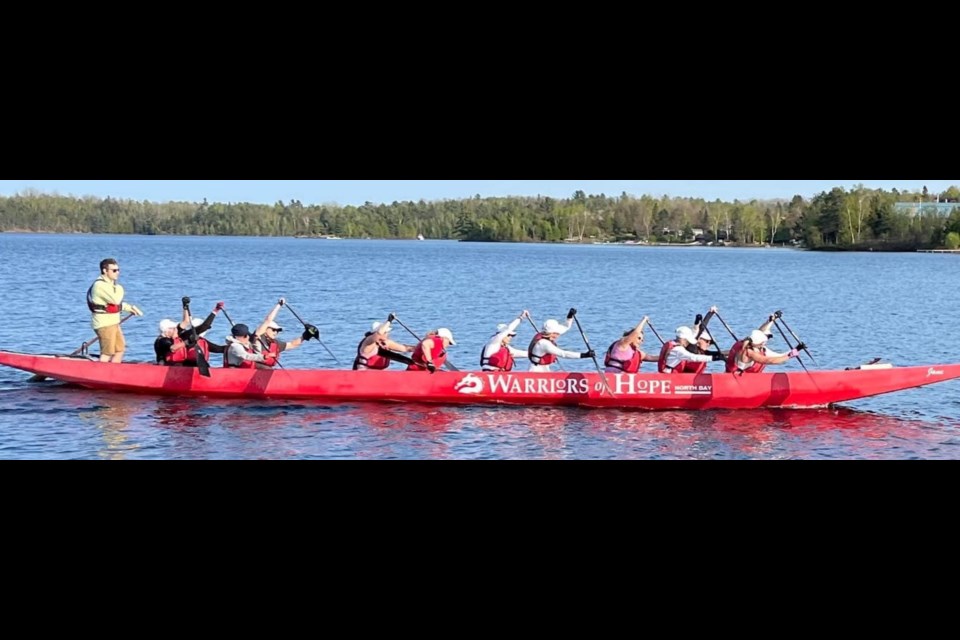Rooted is all about the people, places, and events, that make us proud to call our community home.
---
Formed in October 1999, The Warriors of Hope has become a well-recognized organization that inspires cancer survivors throughout the community. This team of breast cancer survivors has turned the vigorous sport of dragon boat racing into a symbol of triumph over adversity.
For tens of thousands of women and men worldwide who have been diagnosed with breast cancer, these teams are a source of inspiration and community.
Recently, two of those team members Liz Humphrey and Bill Walton shared their personal journeys and their passion for dragon boat racing on the podcast “To North Bay With Love,” hosted by Lisa Boivin.
“I was diagnosed with invasive ductal carcinoma, breast cancer, in 2020—right during COVID,” Humphrey recalls. “I was working from home, felt a lump in my breast, and thought, maybe I should get that checked. After an ultrasound, mammogram, and biopsy, I knew it wasn't going to be good.”
Reflecting on her experience, Humphrey says, “The way they were talking during the tests, I knew something was wrong. The doctor at the hospital confirmed it, saying, ‘Oh no, we’re doing it because it’s something. It could be good, could be bad, but it is something.’ And I knew then.”
From July 2020, Humphrey endured two surgeries, six rounds of chemotherapy, and 20 rounds of radiation. “I’ve been cancer-free since my surgery. They got all the margins clear, but it was a ride,” she shares.
With a family history of cancer, though not breast cancer, Humphrey was eligible for genetic testing due to her mother’s unknown family history. “The genetic testing came back not hereditary. It was just luck of the draw,” she explains.
Humphrey emphasizes the importance of early detection. “I had an aggressive form of cancer, but because it was detected early, it didn’t spread to my lymph nodes. It didn’t spread because we caught it quickly. So, it is important to do those self-exams.”
Every survivor's story is unique. “Not everyone goes through chemo, but some have. It all depends on the stages and the type of cancer,” Humphrey adds.
Walton’s journey began with a self-exam, influenced by his wife, Diana, a breast cancer survivor herself. “I felt a lump in the shower and asked Diana what she thought. She said I better call my doctor. After a biopsy and mammogram, it was clear something was growing.”
He recalls, “The poor gal doing the mammogram said I was the first male she’d seen. We knew something was there, and within about six weeks, I had an operation. We caught it in time.”
Reflecting on the impact of his mastectomy, Walton says, “My surgeon assumed I didn’t want an implant, which was true. It’s a big physical loss, especially for women. My wife chose against an implant and was comfortable with her decision.”
Humphrey says, “I lost my hair and that was a struggle for me. I asked my oncologist what the odds would be that I wouldn’t lose my hair, maybe I would be that one person, but she said, ‘You’re going to lose your hair.’ My hair was falling out after my second round of chemo and that’s when I asked my husband to shave my head, and that was tough for sure. But there are also those lighter moments you laugh through. When you shave it, it still looks like a buzz cut, you’ve got the peach fuzz on top and my son looked at me and said, ‘You look like a lollipop that fell in the rug’ and that was the most accurate thing ever.”
“There are also the moments that you struggle with in public. You’re wearing toques or I remember buying a wig, but I didn’t feel comfortable in my wig, and I just felt that everybody was staring at me like I had this big sign on my forehead that told people I have cancer. Growing my hair back and getting comfortable with it again, that was a process for sure,” she says.
Both Humphrey and Walton found solace and strength in the Warriors of Hope. Walton’s connection began with his wife, who joined the team in 1999. “I went along as a supporter, helped set up tents, travelled with them, and served on the board. When I got breast cancer, the team already knew me well and asked me to join them in the boat.”
Initially concerned about being the only man on the team, Walton says, “We’ve never had any issues. I’m just one of the girls now.”
The team has thrived with significant community support. “Scotiabank started the team, bought the boat, and sponsored us for 10 years. That setup as a charitable organization allowed us to give receipts for donations, which helps with fundraising,” Walton explains.
Humphrey highlights local support, “CFCH sponsors our golf tournaments, 17-Hour Convenience and Gen. 7 helped us purchase new paddles, and Average Joes lets us launch from their dock early in the summer. Later in the season, we launch from CFB 22 Wing. The community support is tremendous.”
Looking to the future, Walton expresses a desire for more outreach. “We talk about doing more with other cancer survivors. When we raced in Sudbury, they had teams for all cancer survivors, not just breast cancer. It would be great to see more survivors join us.”
Humphrey echoes this sentiment, noting the rising cancer statistics. “In Ontario alone, it’s expected that 99,000 people will be diagnosed with cancer in 2024. But I’m lucky to have been diagnosed at a time when there’s so much advancement in treatment. While my journey was tough, I know others had it harder before these advancements.”
Both Humphrey and Walton are committed to raising awareness and advocating for early detection. “We need to keep giving back and supporting others,”
If you have a story idea for “Rooted” send Matt an email at [email protected]
